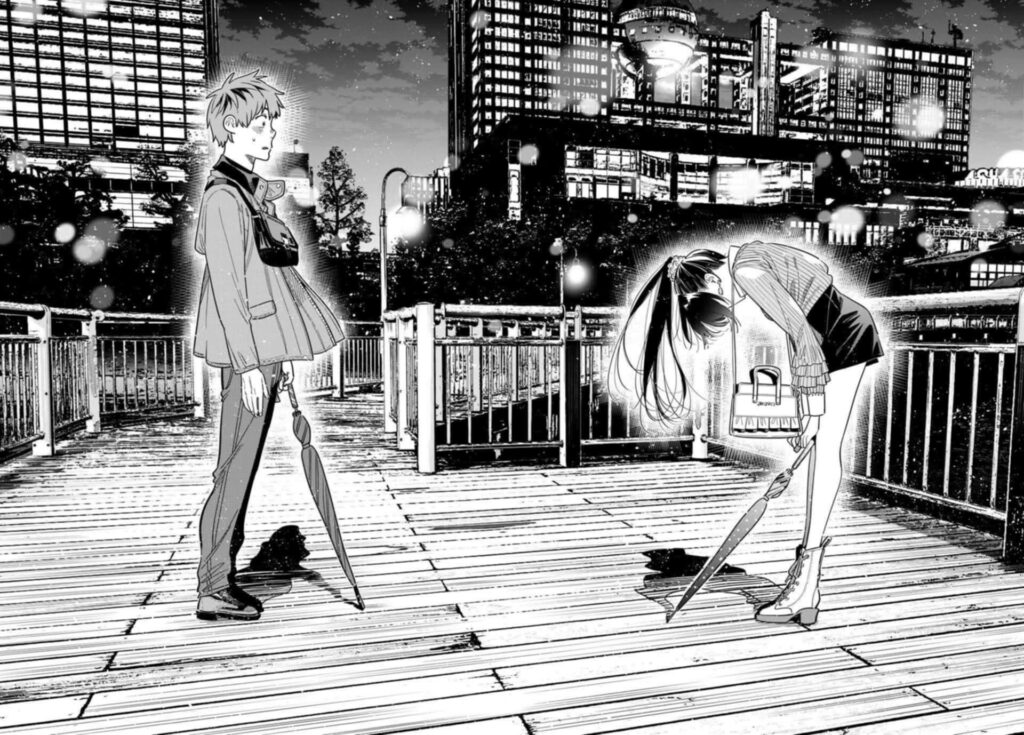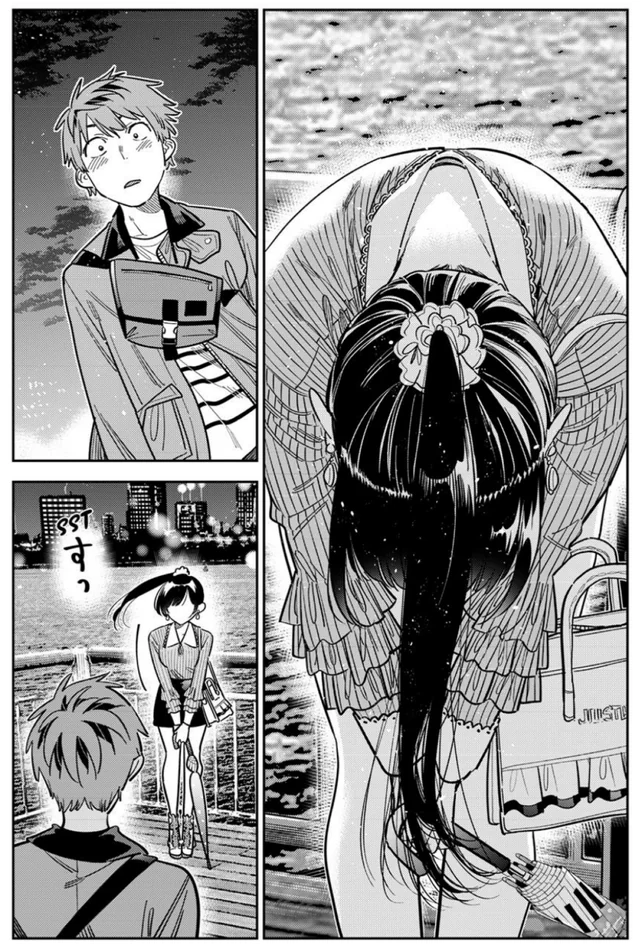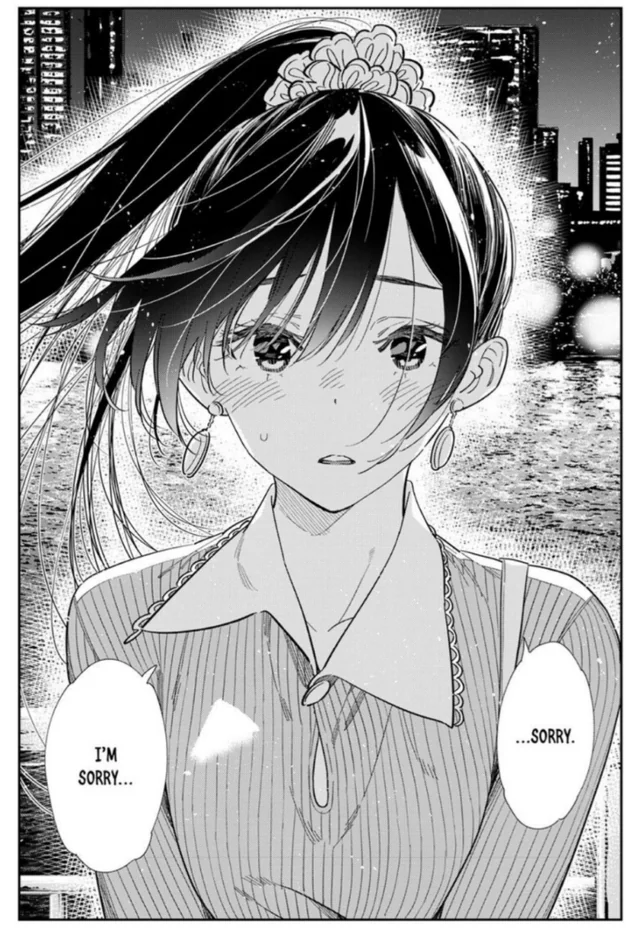An in-depth look at how eight years of romantic buildup crashed and burned in the most meme-worthy way possible in Rent-A-Girlfriend Chapter 380.
After eight years, 380 chapters, and enough romantic tension to power a small city, Rent-A-Girlfriend finally delivered its long-awaited confession scene. The result? Chizuru rejected Kazuya on a bridge in the rain, claiming she wasn’t ready for a relationship due to her work and lifestyle, instantly transforming what should have been the series’ climactic moment into the internet’s newest punching bag.

But this isn’t just another case of disappointed fans—it’s a fascinating crash course in how modern manga culture, author obsession, and community psychology collide to create something simultaneously awful and absolutely captivating.
The Community’s Collective Breakdown: Why We Can’t Quit Kazuya
The Lovable Loser Paradox
Eight years is a long time to invest in anyone, even a fictional character as perpetually hapless as Kazuya Kinoshita. The community reaction to Rent-A-Girlfriend Chapter 380 reveals something fascinating about reader psychology: we’ve all become trapped in an abusive relationship with this manga, and we’re starting to realize it.
Recent fan analysis paints Chizuru as “emotionally indecisive” and potentially “manipulative,” leaving readers feeling “misled”—but here’s the kicker: fans aren’t just mad at Chizuru. They’re mad at themselves for caring this much about a character they simultaneously love and want to shake violently.
Reddit’s Rent-A-Girlfriend community has become a support group for people who can’t look away from a trainwreck. One highly upvoted comment perfectly captures the community’s collective Stockholm syndrome: fans describe Kazuya as someone “being taken advantage of” who’s “impossible to truly hate” despite being “a sad, pathetic loser.”
The Psychology of Cringe Comfort
What keeps readers coming back isn’t masochism—it’s something more complex. Kazuya represents the worst-case scenario of romantic anxiety, the guy who does everything wrong in the most spectacular ways possible. For readers dealing with their own romantic struggles, watching Kazuya fail provides a weird form of comfort: “At least I’m not that guy.”
But Rent-A-Girlfriend Chapter 380 broke the unspoken contract. After years of small victories and character growth hints, readers expected some payoff. Instead, they got reset to square one, and the community’s reaction shifted from “cringe comfort” to genuine anger.
The most telling responses aren’t the jokes—they’re the serious analyses trying to justify or explain the chapter. When fans start writing essays about why a romantic comedy’s eighth rejection scene might actually be good storytelling, you know you’ve crossed into genuinely unhealthy territory.
The Author’s Meta-Obsession: When Fiction Becomes Too Real
Documented Evidence of the Miyajima Phenomenon
The “author is in love with Chizuru” meme isn’t just internet speculation—it’s backed by years of increasingly concerning social media behavior. Reiji Miyajima has taken a life-size Chizuru figurine on actual dates, posting photos with captions about their “date” together. The author’s behavior has faced backlash from fans who view his “addiction” to his character as “unhealthy”.
As recently as March 2024, Miyajima posted AI-generated illustrations of Chizuru, drawing significant criticism from the community. This pattern of behavior suggests something deeper than typical creator-character attachment.
The Meta-Narrative Problem
Here’s where things get genuinely weird: Miyajima’s real-world Chizuru obsession has created a meta-narrative that actively undermines his own story. Readers aren’t just watching Kazuya fail to win Chizuru—they’re watching Kazuya fail to win Chizuru while the author himself seems to be dating her.
This creates an impossible situation for the narrative. If Miyajima pairs Kazuya with Chizuru, he’s symbolically giving up his “girlfriend.” If he doesn’t, he’s essentially admitting that his self-insert protagonist was never worthy of his idealized woman. Rent-A-Girlfriend Chapter 380 suggests he’s chosen the latter, and fans are picking up on the uncomfortable implications.
The author’s behavior has transformed a simple romantic comedy into an unintentional psychological study. Readers aren’t just following Kazuya’s journey—they’re witnessing Miyajima’s public relationship with his own creation, and it’s deeply uncomfortable for everyone involved.
The Perfect Storm: Why Rent-A-Girlfriend Chapter 380 Hits Different

Deconstructing the Bridge Scene
Rent-A-Girlfriend Chapter 380 ‘s bridge sequence isn’t just bad—it’s precisely calibrated to be as emotionally devastating as possible while offering zero narrative payoff. Let’s break down why this moment landed so hard:
The Setup: After 379 chapters of will-they-won’t-they, the scene opens with cinematic elements—rain, dramatic lighting, a bridge (the universal symbol of connection). The visual language screams “climactic romantic resolution.”
The Subversion: Chizuru bows her head to Kazuya, apologizing for her “uncertainty”, delivering what reads as the gentlest possible devastating rejection. It’s not angry or cruel—it’s worse. It’s pity.
The Meta-Context: Knowing Miyajima’s real-world Chizuru obsession, this scene reads less like character development and more like the author protecting his idealized woman from his flawed protagonist.
Why This Feels Different from Previous Rejections
Rent-A-Girlfriend has built its entire brand on romantic near-misses, but Chapter 380 broke the pattern. Previous rejections left room for hope or misunderstanding. This one was definitive enough to feel final while still leaving enough ambiguity to continue the series indefinitely.
The reaction was swift and brutal, with many fans calling it “the worst chapter of the series”, but what made it truly special was how it crystallized eight years of accumulated frustration into a single, perfectly meme-able moment.
The Addiction Economics: Why We Can’t Stop Reading
The Sunk Cost Fallacy in Manga Form
Here’s the uncomfortable truth: most Rent-A-Girlfriend readers aren’t reading because they enjoy it anymore. They’re reading because they’ve invested too much time to quit now. Chapter 380 represents the moment when the sunk cost fallacy became a community-wide psychological phenomenon.
The Investment Hook: Eight years and 380 chapters represent a significant time investment. For weekly readers, this series has been part of their routine for nearly a decade.
The Escalation Trap: Each disappointing chapter raises the stakes for the next one. “Surely this will be the payoff chapter,” becomes the driving thought, creating an endless cycle of hope and disappointment.
The Community Reinforcement: Online communities amplify both the frustration and the engagement. Complaining about Rent-A-Girlfriend has become its own form of content, creating a feedback loop where hate-reading becomes a social activity.
The Psychology of Hate-Reading
Fan concerns about Miyajima’s obsession with Chizuru have been building for years, but the community keeps returning because the series has transcended traditional entertainment. It’s become a shared cultural experience, like a TV show everyone watches just to complain about it together.
The series functions as a kind of emotional regulation tool. Readers use Kazuya’s failures to process their own romantic anxieties, his rejections to feel better about their own relationships, and the community’s shared frustration to bond with fellow readers.
The Meta-Entertainment Value
Rent-A-Girlfriend Chapter 380 revealed something crucial: for many readers, the real entertainment isn’t the story—it’s the community reaction to the story. The memes, analysis posts, angry rants, and defense essays have become more engaging than the actual manga.

This creates a perverse incentive structure where disappointing chapters actually generate more engagement than satisfying ones. A good chapter gets upvoted and forgotten. A terrible chapter spawns weeks of content, discussion, and community bonding.
The Cultural Impact: When Bad Becomes Iconic
Meme Culture and Narrative Failure
Rent-A-Girlfriend Chapter 380 didn’t just fail—it failed so spectacularly that it became its own form of entertainment. The bridge scene has already spawned countless memes, reaction videos, and analysis posts, transforming narrative disappointment into cultural currency.
The scene works perfectly as a meme template because it contains all the elements of peak cringe: overly dramatic visuals, emotional devastation, and a complete disconnect between buildup and payoff. It’s the romantic comedy equivalent of “The Room”—so bad it becomes genuinely entertaining in ways the creator never intended.
The Broader Implications for Romance Manga
Rent-A-Girlfriend‘s success despite widespread reader dissatisfaction raises uncomfortable questions about the romance manga industry. If a series can maintain popularity through reader frustration rather than satisfaction, what incentive do creators have to actually resolve their romantic plots?
The series has essentially weaponized the will-they-won’t-they trope, stretching it beyond all reasonable limits and discovering that readers will continue engaging even when they hate what they’re reading. This is simultaneously impressive from a business perspective and deeply concerning from a storytelling one.
The Verdict: A Masterclass in Accidental Performance Art
Rent-A-Girlfriend Chapter 380 represents something unique in manga history: a moment where creator obsession, reader psychology, and cultural timing aligned to create something that transcends traditional success or failure. It’s not good—it might be objectively terrible—but it’s undeniably significant.
The bridge scene has become a perfect crystallization of everything wrong with modern romance manga: endless padding, creator self-insertion, reader manipulation, and the prioritization of engagement over satisfaction. But in becoming the perfect example of everything wrong, it’s also become genuinely fascinating.
Whether Miyajima intended it or not, he’s created a work that functions as both romantic comedy and inadvertent commentary on the genre’s problems. Readers aren’t just consuming a story—they’re participating in a collective psychological experiment about the limits of emotional investment.
And somehow, incredibly, we’re all still reading.
The author’s next tweet about his “girlfriend” Chizuru will probably break the internet again. See you all in the comments section, fellow sufferers.
Check out our other anime articles!
Read More:
Why The 2025 Crunchyroll Anime Awards Don’t Really Matter (Kinda) – VRSUS
The Upcoming Anime That’s Making Everyone Want to Play Street Fighter 6 – VRSUS
New to Anime? These 5 Series Are Perfect for Beginners – VRSUS





